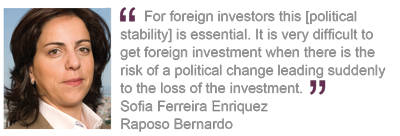Lusophone Africa Special Report 2014: Open for business
Angola, Mozambique and a number of other African nations are attempting to take steps to attract investors as they struggle to realise their full potential.
Which African countries do international investors currently have in their sights? There are six Portuguese-speaking nations on the list: Angola, Mozambique, Guinea-Bissau, Equatorial Guinea, Cape Verde, and São Tomé and Príncipe. Any African investment usually needs a key resource to attract business and, it would seem, energy remains the priority for the first four countries.
Indeed, Angola and Mozambique have already established themselves as emerging powers in the energy market. Angola is Africa’s second-largest petroleum producer (after Nigeria), which has helped push GDP to $114.1bn, according to the World Bank. Mozambique, with a relatively decent GDP ($1.827bn), has grown considerably thanks to discoveries of natural gas.
It is no surprise then that these two countries have been the main choices for international investment. For instance, Sinopec has invested $6bn in Angolan oil discovery, while Anadarko has its flagship $30bn LNG scheme in Mozambique.
However, interest is growing in Guinea-Bissau and Equatorial Guinea. Both boast rich natural resources yet have under-developed projects. In Guinea-Bissau, aside from some extracting and small alluvial gold mining operations, mineral and oil resources have not been developed because political instability is rife. Equatorial Guinea is the eighth-largest crude oil reserve holder in Sub-Saharan Africa – oil contributes 99 percent of its export earnings.
Despite being substantially less advanced than their larger counterparts, both Angola and Mozambique provide inspiration for how Guinea-Bissau and Equatorial Guinea can develop.
“Mozambique’s natural resources have been the main interest of foreign investors in mining, oil, natural gas, renewable energy and hydroelectricity,” observes Paula Duarte Rocha, a Partner with MLC Advogados in Maputo. “The mining and energy sectors – coal, natural gas and possibly oil – are expected to be major economic drivers over the next decade, boosting the economy and investment flows in related and supporting industries.”
But Guinea-Bissau and Equatorial Guinea have yet to secure the investment or sustained programmes that foster growth. It is the mega-projects that spur on the consequential investments in much-needed infrastructure (so urgently needed in post-independence Portuguese colonies), such as railways, ports, roads, and other necessities for workers, like housing, schools, hospitals and hotels.
Natural resources are not in abundance everywhere. The island nations of Cape Verde and São Tomé, for instance, have to find another platform to launch wider economic growth. That platform is tourism. International hotel firms, including Iberostar and Riu, are already in Cape Verde with more on the way, including luxury chain Viceroy Hotel Group.
João Miguel Medina, a Senior Associate at NDR in Cape Verde says the islands have huge potential for investment, especially in roads, airports, public transport, energy and agriculture: “In Cape Verde, tourism can be the key area that everything grows from. We are meant to have another four major hotel complexes by 2017, owned mostly by foreign investors. You cannot have five-star hotels without decent infrastructure.”
 Reckless repatriation
Reckless repatriation
Lawyers point out that any platform for investment can only be built on political, economic and regulatory stability. Investors are wary that uncertainty disincentives foreign investors – the perception of a country and its capacity for stable business in the future is the priority.
“The assessment of political and regulatory risks, always a factor when considering investments in Africa, also varies widely depending on which particular country you are considering,” claims Rui Mayer from Cuatrecasas Gonçalves Pereira. “For instance, from a political point of view, Cape Verde could be considered a stable democracy of the Western European type, while the same qualification could hardly be assigned to Guinea-Bissau, which over the last few years has proved to be one of the most unstable countries of the region.”
Political coups and reckless government repatriation have disastrous effects on investor confidence. The recent problems in jurisdictions like Central African Republic, South Sudan and Somalia underline the need for stability.
Guinea-Bissau is one example. Sofia Ferreira Enriquez from Raposo Bernardo points to the coup d’état of April 2012 as having strongly affected economic activity: “Industrial and construction activities experienced a strong decline and fiscal and external accounts have worsened.” Guinea-Bissau’s recent general elections were postponed and there was a threat of United Nations sanctions.
“The main challenges for investors willing to enter the Guinean market are related to the fact that Guinea-Bissau is one of the poorest countries in the world, having more than two-thirds of the population living under the poverty line,” explains Vitor Marques da Cruz, from MC&A. “This, of course, means that the country has poor infrastructure and weak social indicators. Guinea-Bissau has suffered since its independence from Portugal from severe political instability, which still continues to hinder its development and modernisation.”
Mayer adds that confidence depends on whether Guinea-Bissau succeeds in evolving into “an organised state and into a stable democracy”.
Enriquez concurs: “For foreign investors this [political stability] is essential. It is very difficult to get foreign investment when there is the risk of a political change leading suddenly to the loss of the investment. Once this goal is achieved, the country may start to fight corruption and to enforce a reliable legal system. Also important factors in boosting confidence.”
Equatorial Guinea also has to shed its negative image. There is an abundance of gold, diamonds and bauxite and the country is scheduled to join the Community of Portuguese Language Countries soon, yet it is still alleged to be a “dictatorship” following the coup by Teodoro Obiang Nguema Mbasogo in 1979 – Mbasogo has remained president ever since.
“Between the two, I would say that Equatorial Guinea seems to hold a better starting position, as it is a well-established oil and gas producer and has the basic administrative structure in place,” Mayer continues.
As an example of how to negate political risk, Miguel Medina points to Cape Verde’s establishment of a model where a company can set-up a bilateral contract directly with the state: “This contract protects them from changes in the law and regulations as well as a change in government.”
Regulation nation
Political stability leads to regulatory stability but laws can be complex and connected to specific cultures. Establishing the rule of law becomes a challenge and a strong legal framework is vital if a country is to flourish.
Filipe Carvalho from VCA in Luanda highlights Angola, which has experienced a change in legal framework but the topic remains an issue: “Investors tend to fear the local judicial system which almost leads, if possible, to the choice of arbitration to solve potential litigation issues.”
Investors need to know that laws are acceptable and enforceable, ideally benefiting both local and international parties. Negotiating the local courts when things go wrong would be problematic so legislation needs to strike the right balance.
“From a regulatory point of view, both Angola and Mozambique have over the last few years enacted legislation that aims at ensuring that a larger share of the revenues generated by the exploitation of their natural resources is directed to internal development,” says Mayer. “The aim is clearly stated – economic sustainability requires the development of strong domestic production capacity that will satisfy the needs of a growing middle-class, which will develop naturally as a consequence of the higher investment in national capacities and resources.”
Rocha says that, for several years now, Mozambique, has been reorganising its legal system too. “This government awareness of the need to review and draft legislation that provides an adequate legal framework to ensure investors have the required protection and at the same time guaranteeing Mozambicans that their interests will be protected and that they will be granted the opportunity to benefit from this economic growth has been seen as creating uncertainty and apprehension on the side of investors,” she says, “especially from the point of view of structuring and negotiating long-term contracts.”
Incentives are also becoming more common. The Cape Verde Government established a series of incentives to attract foreign investment. For example, the country has a flat rate of VAT at 15 percent, which drops to six percent for tourism-related matters. “The areas in which there has been the highest growth are ports, airports, green energy facilities and tourist complexes,” Marques da Cruz says.
The ultimate award for macro-economic stability is for a country to become officially investable. “The most important thing for attracting investment is for a state to be rated,” explains Miguel Castro Pereira, Managing Partner of Abreu Advogados. “Angola, Cape Verde and Mozambique all have stable B category ratings from the major ratings agencies – if this is combined with a strong economy, sophisticated financial markets and political stability, then investors’ interest and appetite will continue to grow.”
Potential growth
Despite all the interest, African nations struggle to establish themselves on the global stage. Carvalho says Angola is an attractive country for international investors as its full potential is yet to be fulfilled. He also sees a trend for investment in other counties, including those in Francophone Africa, though these are still limited to oil and related sectors.
“The sustainable growth of investment and the spread of investment to different areas is due to an increase of investors’ confidence,” he continues. “In recent years we have seen a change in the focus of the investment – we now experience a growth in the infrastructure, real estate and transportation sectors.”
The established countries are now looking to expand beyond energy or tourism platforms. Carvalho says growth in Angola is driven by the need to reach different areas other than the main cities, which have been growing based on a policy to disperse investment through a system of tax and customs benefits for inland and/or less developed regions. Angola has begun to focus on the development of a legal framework for investment funds based on the recent Legislative Presidential Decree 7/13 and sustained by the regulations that are still under public discussion, but soon to be enacted.
“The new investment funds will allow not only the development of the securities market but essentially promote the growth of the real estate market based on real estate investment funds,” Carvalho claims. “Considering the risks and challenges, a regulatory framework will undoubtedly allow investors to build confidence on such types of investment.”
Duarte Rocha observes a similar trend for more sophisticated business opportunities outside of energy in Mozambique: “We see particular growth and potential for investors in public-private partnerships. This is increasingly the means for governments in countries such as Mozambique to rehabilitate their infrastructure, given the significant capital requirement of infrastructure investment and the lack of technical capacity in the government to manage investments.”
Africa remains a continent of contradictions. It is dense, diverse and difficult. While the potential of countries remains huge, realising that potential is the biggest challenge. Portuguese colonies are still relatively young – Cape Verde and Guinea-Bissau both declared independence in 1973 with Angola, Mozambique and São Tomé and Principe following suit in 1975. Developing a durable and robust economy is a process of evolution, not revolution.












